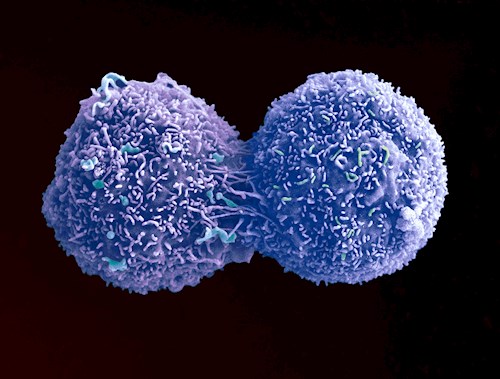CRIS: a timeline
Click through the slideshow to see highlights of CRIS news from 2024:
Email newsletter
For the latest news and updates, subscribe to our email newsletter.
Read our April 2025 newsletter
Read our December 2024 newsletter
Timeline: from 2007 to present
Click on the heading to open/close the drop-down with more information
In September 2023, the CRIS ethics was renewed for a third time. Approved by the South-Central Oxford C Research Ethics Committee, this approval enables CRIS to continue to be used as a database for secondary analysis.
In 2023, the eLIXIR: Born in South London project was awarded an MRC Longitudinal Population Study Grant which will enable them to operate for the next 5 years and continue building this dynamic mother-child database. The Clinical Data Linkage Service also conducted the fourth refresh of the data linkage, making data up to July 2023 available for research.
The Clinical Informatics Service is an innovative data driven approach to improving patient care. It uses many of the tools and techniques developed by CRIS over the years, to generate rich healthcare intelligence at both population and patient level.
In 2023, the Clinical Informatics Service was awarded funding by the Maudsley Charity to transition into a sustainable operational service over a two-year period.
In 2023, our data linkages with Hospital Episode Statistics provided by NHS England and GP data from the London Borough of Lambeth, provided by Lambeth DataNet were refreshed allowing us for the first time to capture comprehensive healthcare use over the Covid pandemic and post-pandemic period.
Launched in 2023, MH-TAC is a prototype cloud-based platform set up within the NHS firewall that will allow Natural Language Processing (NLP) algorithm hosts to have secure domains within which uploaded text files from different mental health services can be processed and returned to users with the required NLP-derived meta-data. MH-TAC is a key contribution by the CRIS team to the DATAMIND HDR-UK Mental Health Hub.
Medichec, a CRIS translation initiative, is a tool which helps to identify medications that might have a negative effect on cognitive function and/or other adverse effects in older people. In 2023, Medichec version 3 was released, the new version incorporates additional adverse effects including constipation.
The patient-led CRIS Oversight Committee is responsible for overseeing and monitoring the use of CRIS, including managing the CRIS application process. In 2023, the CRIS Oversight Committee appointed a new service user Chair.

Over the past year, there have been several important publications coming out of the data linkage between CRIS and GP data from the London Borough of Lambeth, known as Lambeth Data Net (LDN), including:
- The impact of dementia on diabetes control: an evaluation of HbA1c trajectories and care outcomes in linked primary and specialist care data. This study, led by Dr Usha Gungabissoon, highlights important differences in the monitoring, management, and control of diabetes in people with dementia. It suggests these differences may need to be considered in treatment guidelines and by primary care services.
In 2022, CRIS researchers in collaboration with colleagues at the Cicely Saunders Institute of Palliative Care, published an academic paper which used CRIS data linked to Hospital Episode Statistics (HES) to describe patterns of unplanned hospital admissions in people with dementia. This paper was published in the Oxford University Press journal: Age & Ageing and is also contributing to the EMBED-care project led by Professor Catherine Evans.
The team, led by Emel Yorganci, found a steep rise in hospitalisations before death. This highlights the need for improved community care and services for people with dementia who are approaching the end of life. This paper demonstrates how the linkage between CRIS and HES is being used in novel and important ways which can have a real-world impact on the way in which patients are cared for.
There are several projects in the works stemming from the HES linkage. One includes research led by Dr Gayan Perera: investigating mental health outcomes after surgery. This has involved collaboration with surgical colleagues and will have more findings to come.

eLIXIR is a collaboration between King’s College London, the South London and Maudsley, King’s College Hospital, and Guy’s and St Thomas’ NHS Foundation Trust bringing together data from maternity, neonatal, mental health care and GP records to enable research into health in pregnancy and across the life span.
In 2022, the Clinical Data Linkage Service (CDLS) conducted the third refresh of the eLIXIR data linkage, making data up to November 2021 available for research. The CRIS Team continue to support the eLIXIR programme by providing a data extraction service, assisting eLIXIR researchers with the development of project specific linked datasets.
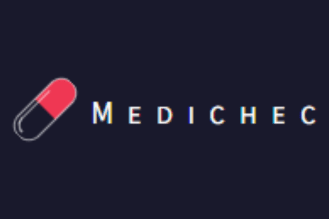
Medichec is a tool, developed by researchers and clinicians at the South London and Maudsley NHS Foundation Trust. It helps to identify medications that might have a negative effect on cognitive function and/or other adverse effects in older people. Details of the tool and its development have been published in the International Journal of Geriatric Psychiatry.
The CRIS Team have supported the development of Medichec by providing the data for the following recent publications. These papers are building up evidence to support the categorisation of cross-formulary properties of medications so that the Medichec team can better investigate adverse outcomes:
People living with mental illness are more likely to experience violent victimisation compared to the general population, but despite this, data on interpersonal violence are inconsistently recorded within health care records. Therefore, a team of CRIS researchers (including Dr Angus Roberts, Dr Vishal Bhavsar and Dr Giouliana Kadra-Scalzo) set out to develop a Natural Language Processing (NLP) application to help identify clinical text referring to interpersonal violence within CRIS.
The team is now continuing this work as part of the UKRI Violence, Health and Society Consortium (VISION). This group aims to reduce the violence that harms health by improving the measurement and analysis of data on violence. The NLP methods will be extended to encompass emotional and financial abuse, and to cover other types of text such as police records. Dr Giouliana Kadra-Scalzo has also published a related research paper demonstrating research outcomes for the violence applications.
After a period of development work, the team successfully demonstrated that it is possible to use state-of-the-art NLP methods to extract clinical text referring to violence, and in 2022, they published their findings in BMJ Open. This application developed is supporting further research into the pathways by which violence is identified in clinical practice and the effectiveness of systems for identifying, assessing and managing interpersonal violence.
The success of applied initiatives such as the psychosis VIEWER population health management platform and the real-time service monitoring over the COVID-19 pandemic led to investment by South London and Maudsley NHS Foundation Trust in a Clinical Informatics Service, led by Matthew Broadbent and fully integrated with the CRIS team. Informatics innovations to date, such as our extensive catalogue of NLP apps have been developed primarily with research applicability in mind but have substantial additional utility for informing Trust quality improvement, including improvements to clinical care pathways and population health management. The aim of the new Clinical Informatics Service is to exploit these innovations, working directly with clinicians and clinical services and providing novel and relevant information to help inform improvements in patient care.

Data from the linkage between CRIS and the National Pupil Database (NPD) has been used to support an academic paper led by Dr Alice Wickersham exploring the educational attainment trajectories among young people with depression.
The team found that young people who receive a depression diagnosis during their school career show a drop in attainment in Year 11. They concluded that gender, ethnicity and socioeconomic status predict more vulnerable subgroups within this clinical population who might benefit from additional educational support or more intensive treatment.
The CRIS Team are currently supporting a refresh of the data linkage with the NPD to provide more up to date education data which will enable researchers to further investigate the relationship between mental health and educational outcome.
VIEWER is an important and operationally applied example of how research infrastructure generated via CRIS and CogStack services can be fed back to the source electronic health record in order to support clinical decision making and service improvement.
The novel VIEWER platform is being used at SLaM to visualise patients with non-affective psychosis, both in secondary care and those discharged to primary care. Those discharged to primary care have significant needs with regards their physical and mental health and may benefit from some speciality monitoring or treatment even after discharge. In terms of case load management, VIEWER allows clinicians to see their caseload and ensure equitable care in terms of an evidence-based care pathway. This might include how often patients are seen, beds used, medication prescribed, psychological therapies offered, and physical healthcare provided. A key functionality of the platform allows the clinician to move from the population or caseload to the individual case and hyperlink directly into the Electronic Health Record (EHR). Simple applications allow for medication reviews, while ‘flagging’ can be built-in to highlight abnormal or absent data to clinicians.
More broadly, the platform allows clinicians and local managers to plan innovative integrated services with local GPs. Patients with chronic long-term conditions and other comorbidities who have been discharged, often on long term psychiatric medication, can now be seen and prioritised for discussion. Better coordinated and planned tertiary prevention of those who have been discharged is likely to reduce relapse, allow for earlier intervention in this group, and avoid the levels of crisis and coercive care which can at times overwhelm Trust systems and adversely affect patient welfare.
The platform also visualises new instances of psychosis over the last 2 to 3 years, to enable identification of where new cases are emerging. This visualisation of incidence on a map allows the Trust to better target limited resources for earlier intervention and approaches aimed at the causes of disorder, for example cannabis reduction, work with families, or other social interventions. Inequalities can be visualised, allowing differences to be addressed. The data over time application allows live data to be tracked week-to-week where the impact of new service developments or quality improvement initiatives can be seen directly in clinical outcomes across the population.
The depth and detail of information available on VIEWER would not be possible without the expertise and experience that have been developed within the CRIS and CogStack teams, including over 10 years of natural language processing work to extract clinically important entities from text fields.
 By law, fertility clinics have a duty to submit data to the Human Fertilisation and Embryology Authority (HFEA) about fertility treatments taking place and babies born as a result. The HFEA hold this data on a secure database, which is the longest running database of its kind in the world. This register collects data on more than 75,000 treatments that take place in UK fertility clinics each year. The Clinical Data Linkage Service (CDLS) has linked the HFEA database to CRIS and currently holds anonymised HFEA data for female patients of the South London and Maudsley NHS Foundation Trust who have also undergone fertility treatment within the UK.
By law, fertility clinics have a duty to submit data to the Human Fertilisation and Embryology Authority (HFEA) about fertility treatments taking place and babies born as a result. The HFEA hold this data on a secure database, which is the longest running database of its kind in the world. This register collects data on more than 75,000 treatments that take place in UK fertility clinics each year. The Clinical Data Linkage Service (CDLS) has linked the HFEA database to CRIS and currently holds anonymised HFEA data for female patients of the South London and Maudsley NHS Foundation Trust who have also undergone fertility treatment within the UK.
We believe it will be the first undertaking of its kind to demonstrate the use of routinely collected mental health and fertility treatment data in order to understand the two-way relationships between infertility/fertility treatments and the treatment/outcome of mental health disorders. By undertaking this linkage, and subsequent research projects, it will provide a strong evidence-base to improve understanding of people’s risks and experiences, informing service improvement, and guiding targeted intervention to improve outcomes and experiences of women undertaking fertility treatments.
The HIV and AIDS reporting system (HARS) was developed by Public Health England (PHE) in conjunction with the Department of Health and the Clinical Reference Group for HIV. All outpatient HIV service providers submit data to HARS on a quarterly basis. HARS contains clinical data on all people diagnosed with HIV in England and this information is used to monitor the quality of care provided to people with HIV, support the commissioning of HIV services, and increase the efficiency and quality of HIV monitoring. The CDLS has linked HARS to CRIS and currently hold anonymised HARS data for patients of the South London and Maudsley NHS Foundation Trust. This data linkage provides a resource for investigating the health care of people with HIV and mental disorders, with the aim of improving the care that they receive.
HIV in people with severe mental illness (SMI) is an incredibly under-researched area in the UK, therefore, research is needed to examine the prevalence of HIV in people with SMI, the identification of at risk groups, parity in treatment and testing compared to the general population, and clinical challenges (e.g. adherence to medication). Linking mental health data from CRIS with information on HIV from HARS will allow us to answer questions about risk and clinical picture both in terms of HIV status and mental health status. This work has the potential to highlight areas of need in treatment and prevention of HIV in people with SMI. Findings of the research will be fed back to relevant organisations such as NICE and promoted locally with the aim of directly impacting NHS policies and current patient care.
 The Department for Work and Pensions (DWP) is responsible for welfare, pensions, and child maintenance policy within the UK; they collect information on a range of different key state benefits, for example Employment and Support Allowance (ESA), Permanent Injury Benefits (PIB), and Job Seekers Allowance (JSA). The Clinical Data Linkage Service (CDLS) has linked CRIS to data from the DWP; this linkage includes important anonymised information on benefits received, as well as details of any programmes attended, such as work support schemes.
The Department for Work and Pensions (DWP) is responsible for welfare, pensions, and child maintenance policy within the UK; they collect information on a range of different key state benefits, for example Employment and Support Allowance (ESA), Permanent Injury Benefits (PIB), and Job Seekers Allowance (JSA). The Clinical Data Linkage Service (CDLS) has linked CRIS to data from the DWP; this linkage includes important anonymised information on benefits received, as well as details of any programmes attended, such as work support schemes.
This linkage is the first between NHS health records and DWP data. The main purpose of this project is to examine the effect of welfare reform and current assessment policies on mental health recovery and relapse: this would include examining the impact of potentially positive events (engagement in a work support packages) and negative events (regular work capability assessment, benefit sanctions, and the reduction or removal benefits) on a patient’s mental health.
The linkage between CRIS and the DWP is important because many adults seek psychiatric help for symptoms which impact heavily on their ability to work. Understanding patients’ benefit and occupational needs is essential to ensuring that people with mental disorders receive the best possible care. This linkage will help to provide high quality research outputs that examine the interface between mental health, work, and welfare. Ultimately, this will provide much needed evidence to direct occupational health and welfare policy initiatives.
Results will be fed back to relevant organisations such as the Department of Health and the DWP and will be promoted locally with the aim of directly impacting patient care, through informing changes to NHS and government benefit policies.
2021 marked the successful completion of longstanding work to ascertain instances and experiences of violence in the mental healthcare record and the commencement of important new initiatives to develop this further.
Supported originally by a 2017 MRC award led by Professor Louise Howard, and drawing on the NLP expertise of the research group led by Dr Angus Roberts, a suite of algorithms was developed to ascertain recorded instances of violence within the mental healthcare record, classifying this according to perpetration/victimisation and according to its nature and context (e.g., physical, sexual, domestic). This allows, for the first time, the routine ascertainment of experiences of violence at scale as recorded in routine clinical practice.
Initial performance metrics have been published.
Professor Rob Stewart and Dr Angus Roberts subsequently supported the successfully funded 5-year research consortium on violence, health and society led by Prof. Sylvia Walby at City University of London (UKPRP, £7m), launched in 2021, which is funding the further development of our violence NLP algorithms in mental healthcare records, as well as providing the opportunity to work with partners beyond healthcare on wider text processing initiatives in this field.
In addition, a linkage between CRIS and DATIX, the South London and Maudsley NHS Foundation Trust (the Trust) incident reporting system, was completed. Through this linkage details of violent incidents involving Trust patients that might not be recorded or easily extracted from the clinical record can now be evaluated and investigated in relation to clinical factors recorded in CRIS.
Led by South London and Maudsley NHS Foundation Trust (the Trust) Digital Services, the whole CRIS infrastructure was successfully migrated off its ‘local’ virtual servers and into the secure Trust tenancy in the Azure cloud, utilising SQL Managed Instance infrastructure.
Health Data Research UK (HDR UK) and the Medical Research Council (MRC) launched a Hub to provide data resources for mental health research and innovation. The Hub is led by researchers from King’s College London and Swansea University and will improve the discoverability and usability of diverse data sources for research to help improve the lives of people with mental health problems.
 The Hub is called DATAMIND and aims to improve the use of big data for mental health research by providing data services, tools and expertise to a wide range of users. DATAMIND will operate across the four nations of the UK, bringing together expertise from the NHS, universities, charities, research institutes and industry. The Hub is led by Professor Ann John at Swansea University and Professor Rob Stewart, Informatics Deputy Lead at NIHR Maudsley Biomedical Research Centre.
The Hub is called DATAMIND and aims to improve the use of big data for mental health research by providing data services, tools and expertise to a wide range of users. DATAMIND will operate across the four nations of the UK, bringing together expertise from the NHS, universities, charities, research institutes and industry. The Hub is led by Professor Ann John at Swansea University and Professor Rob Stewart, Informatics Deputy Lead at NIHR Maudsley Biomedical Research Centre.
In September 2021, the Clinical Data Linkage System (CDLS) was audited by NHS Digital to ensure that the terms and conditions set for the linkage between CRIS and Hospital Episode Statistics (HES)/Office for National Statistics (ONS) Mortality data were being abided by and that data were being kept safe and secure. Based on the audit, NHS Digital identified a number of areas of good practice and concluded that the overall risk of a breach of the terms and conditions with respect to compliance, duty of care, confidentiality or integrity was low.
The CRIS query tool is a query building tool that facilitates direct access to CRIS repositories for approved users. After more than 10 years use and a number of changes in underlying technology over that time a project to refresh the original CRIS tool was initiated. Following widespread consultation, the new CRIS query tool includes a range of functional improvements as well as retaining all the best features of the original version. Importantly the new tool is designed to sit on industry-standard data platform – MS SQL Server – which significantly increases the flexibility of the tool, both in terms of further developments and the potential to deploy it elsewhere.
 The COVID-19 pandemic had wide and unforeseen consequences across health sectors. These included profound effects on mental health and mental health services. CRIS played an important role in helping us understand these effects and improve care.
The COVID-19 pandemic had wide and unforeseen consequences across health sectors. These included profound effects on mental health and mental health services. CRIS played an important role in helping us understand these effects and improve care.
Since the lockdown began the CRIS team have worked to turn around research activity and focus this on the pandemic and its consequences for people using mental health services.
As well as setting up a number of studies, they have prioritised a series of initiatives to improve the usefulness of CRIS data. These included seeking permission for regular updates from the Acute Trust partners on emergency or hospital care by South London and Maudsley NHS Foundation Trust service users over the pandemic period, as well as making good use of the CRIS data linkage already set up with local GP records.
Read more about COVID-19 research which used CRIS data.
Data linkage is the joining of two or more independent databases that share a variable at an individual record level – for example, someone’s GP record and their hospital record will share a unique ‘NHS number’. Linkage between different sources helps to improve the quality of information and enables researchers to look at patients’ healthcare in more detail – for example, investigating how general practice and hospital care might be better coordinated. Although datasets may be linked on unique ‘identifiers’ such as NHS number, these are all removed, and the information is fully anonymised prior to any researchers being given access to it. The CRIS team co-created an animation with funding from the MRC to explain data linkage and how it has contributed to the evolution of healthcare research.
 The Child and Family Court Advisory and Support Service (CAFCASS) represent children in family court cases in England. They operate within the law set by Parliament (Criminal Justice and Court Services Act 2000) and under the rules and directions of the family courts, and they are independent of the courts, social services, education and health authorities and all similar agencies. It is CAFCASS’s duty to safeguard and promote the welfare of children going through the family justice system.
The Child and Family Court Advisory and Support Service (CAFCASS) represent children in family court cases in England. They operate within the law set by Parliament (Criminal Justice and Court Services Act 2000) and under the rules and directions of the family courts, and they are independent of the courts, social services, education and health authorities and all similar agencies. It is CAFCASS’s duty to safeguard and promote the welfare of children going through the family justice system.
CAFCASS collect data on family court cases that they are involved in, including:
- the number of cases where the court has asked CAFCASS to carry out work in private law cases;
- the number of care order applications made by local authorities;
- the length of time taken to complete care and supervision proceedings;
- and the rate of care order applications by local authorities.
CRIS has been linked with CAFCASS data to enable researchers to understand the mental health needs of mothers involved in care proceedings (family court cases where the council applies to have a child removed from parental care due to serious concern over their health or wellbeing). Mothers whose children are placed into public care or adoption often have high levels of health needs, such as drug and/or alcohol misuse, exposure to violence, mental health problems as well as chronic physical conditions. However, information is lacking on how health services address these needs. This linkage will enable researchers to determine the needs of mothers before, during and after care proceedings by using longitudinal data on mental health service use.
2018 | eLIXIR project set up to investigate how events in pregnancy and birth impact lifelong health
 Scientists are currently undertaking research to provide evidence on the entire life course of some of the most common diseases from pregnancy to adulthood, and how they might be prevented. Led by Professor Lucilla Poston, using CRIS, and commencing this year, the eLIXIR (early-Life data cross-Linkage in Research) project links information from maternity, neonatal, and mental health records with blood samples from mothers and children from South London and Maudsley NHS Foundation Trust (SLaM). Over many years this will develop into a powerful resource to help scientists discover when and how health problems begin, how they might be prevented, and what treatments work best for which people. In the future, researchers plan to extend this work to link with primary care data, child clinical health data, and national hospital and school data. Read more about the eLIXIR project on their website.
Scientists are currently undertaking research to provide evidence on the entire life course of some of the most common diseases from pregnancy to adulthood, and how they might be prevented. Led by Professor Lucilla Poston, using CRIS, and commencing this year, the eLIXIR (early-Life data cross-Linkage in Research) project links information from maternity, neonatal, and mental health records with blood samples from mothers and children from South London and Maudsley NHS Foundation Trust (SLaM). Over many years this will develop into a powerful resource to help scientists discover when and how health problems begin, how they might be prevented, and what treatments work best for which people. In the future, researchers plan to extend this work to link with primary care data, child clinical health data, and national hospital and school data. Read more about the eLIXIR project on their website.
The successful linkage of CRIS with census record data from the Office for National Statistics (ONS) will provide an important opportunity to understand social disadvantages and inequalities faced by people living with mental disorders. This followed the earlier CRIS linkage with the National Pupil Database in 2013, which has allowed important questions to be answered on interrelationships between education and mental health. A number of informative linkages with data outside healthcare that allow investigations of the much wider causes, contexts, and consequences of mental disorders are anticipated.
Read more on our website.
Ten years since its launch, CRIS is now the most in-depth mental health resource in Europe, containing over 400,000 anonymised mental health records. It has been deployed across several other mental health trusts in the UK, and over 130 research papers have been published using data from the system.
Matthew Broadbent, CRIS Clinical Informatics Lead said: “The value of CRIS is reflected in the increasing demand to use it over the past decade, rising to over 120 project applications per year. More than anything, the success of CRIS is down to the imagination, skill, and determination of the team of people who have set it up, keep it running, and support its day-to-day use.”
Commenting on future plans, Professor Robert Stewart, Academic Lead for CRIS said: “There are real opportunities for the UK to achieve a unique position in ‘healthcare data science’ by drawing on routine information from clinical care to better understand health and disease and improve services. Using CRIS, successful broader platforms like eLIXIR can be readily replicated in other Trusts and built into strong national networks. This will help the NHS to become a true world leader in clinical informatics.”
For the large number of people with dementia who receive care at the South London and Maudsley NHS Foundation Trust (the Trust), CRIS research has particularly focused on the medicines (often numerous) that they may already be taking for other conditions and symptoms, investigating whether these might have adverse effects on outcomes. For example, we’ve become increasingly aware that medicines known to have centrally acting anticholinergic properties can have a negative impact on cognitive function. These medicines are used for a broad range of physical conditions including urinary incontinence, pain and depression. Drugs that block the action of the neurotransmitter acetylcholine increase the risk of cognitive decline and dementia, particularly in older people.
 In 2017, we launched Medichec as an online tool to help clinicians identify medicines that could cause memory and cognitive problems in older people through their central anticholinergic actions. This helps to inform the choice of medicines and any changes. Since its launch, Medichec has been integrated into Older Adult Mental Health assessments at the Trust and is being used across a number of other NHS Trusts and internationally.
In 2017, we launched Medichec as an online tool to help clinicians identify medicines that could cause memory and cognitive problems in older people through their central anticholinergic actions. This helps to inform the choice of medicines and any changes. Since its launch, Medichec has been integrated into Older Adult Mental Health assessments at the Trust and is being used across a number of other NHS Trusts and internationally.
In 2020, Medichec version 2.0 was launched which added drowsiness and dizziness/hypotension as side effects that were quantified across the formulary – again, particularly to inform prescribing in dementia, but with wider potential applicability. In addition, Medichec was made available as an app on Android and Apple platforms and the online resource was replicated in Greek and Turkish translations, supported by colleagues who wished to make it more widely accessible.
In 2022, we anticipate launching Medichec version 3.0 which will add four more adverse effects: bleeding risk, hyponatraemia, QTc interval prolongation, and constipation.
Medichec versions have been developed by Delia Bishara, Dr Justin Sauer, Dr Chrisoph Mueller and Professor Robert Stewart in collaboration with Mindwave Ventures and with the support of the Mental Health of Older Adults and Dementia Clinical Academic Group at the Trust. Its development has been part-funded by the NIHR Maudsley Biomedical Research Centre and Centre for Translational Informatics.
The classifications underlying Medichec are supporting an increasing range of CRIS publications, as they allow properties of medications to be quantified beyond recognised indications. Examples of published output are provided below:
- The anticholinergic effect on cognition (AEC) scale-Associations with mortality, hospitalisation and cognitive decline following dementia diagnosis
- Centrally-acting anticholinergic drugs- associations with mortality, hospitalisation and cognitive decline following dementia diagnosis in people receiving antidepressant and antipsychotic drugs
- Centrally Acting Anticholinergic Drugs Used for Urinary Conditions Associated with Worse Outcomes in Dementia
- Sedation-Associated Medications at Dementia Diagnosis, Their Receptor Activity, and Associations With Adverse Outcomes in a Large Clinical Cohort
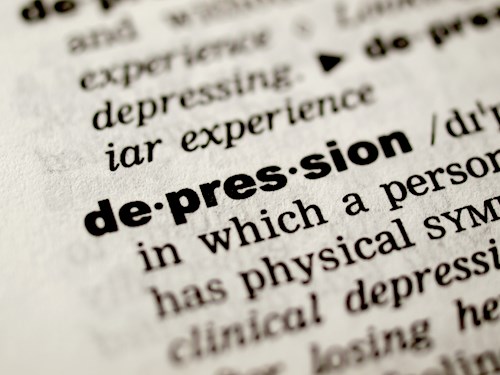
Richard Jackson and the teams at King’s College London Institute of Psychiatry, Psychology & Neuroscience (IoPPN) and the University of Sheffield developed Natural Language Processing (text mining) models that can capture a broad range of severe mental illness symptoms from free text contained in electronic mental health records. By analysing discharge summaries of over 15,000 patients with severe mental illnesses contained in CRIS, they identified large amounts of novel information on 46 symptoms, more recently supplemented by 20 depression symptoms. This CRIS-CODE project, published in BMJ Open, offers a new powerful tool for the collection of diagnostic and outcome data as well as symptom profiles from electronic health records.
The Clinical Data Linkage Service (CDLS), in collaboration with colleagues in the CRIS team set up the Data Linkage Service User and Carer Advisory Group. The group is a regular meeting of people with lived experience of mental illness, all of whom have an interest in mental health research involving data linkage. The group meets on a quarterly basis and researchers are invited to present their project and receive feedback and advice from the group. Read a paper about the group.

The Centre for Translational Informatics (CTI) was established in June 2016 to enable CRIS to have a more direct impact on clinical care. The aim was to find new ways of improving mental healthcare using digital technologies, and to accelerate their delivery to patients.
Building on research breakthroughs made at the NIHR Maudsley Biomedical Research Centre, the CTI provides a front door to collaboration with the digital health industry. Partners include technology companies such as IBM and FitBit; academic institutions including the University of Cambridge and the University of Michigan; and many other research organisations including UK Biobank and the Farr Institute of Health Informatics Research.
Recognising that digital products and services have often failed in the NHS due to a lack of buy-in from frontline staff and service users, the CTI puts service users, carers, and clinicians at the heart of projects as designers and developers. Research at the CTI has resulted in the development of digital solutions that are transforming the way healthcare is provided including Healthlocker, Agents in Records, CogStack and Medichec.
Read more about the CTI on our website.
By analysing the CRIS health record of more than 7,500 individuals with schizophrenia from the South London and Maudsley NHS Foundation Trust (the Trust), researchers identified a link between negative symptoms experienced by people with schizophrenia and poor clinical outcomes. People with schizophrenia usually experience a combination of negative symptoms (e.g. poor motivation, emotional withdrawal, and a reduction in speech and activity) and positive symptoms (e.g. hallucinations and delusions).
Using Natural Language Processing (text mining), the research team led by Dr Rashmi Patel from the Institute of Psychiatry, Psychology & Neuroscience (IoPPN) at King’s College London, found that negative symptoms are a relatively common feature of schizophrenia and are associated with increased hospital admission, readmission, and length of inpatient stay. Published in BMJ Open, the findings highlight the importance of developing effective treatments for the negative symptoms of schizophrenia.
This paved the way for a range of automated information extraction tools to be developed over the following 2 years (see 2017) to help CRIS scientists move beyond diagnosis to symptom profiling of other mental health conditions.
 The Improving Access to Psychological Therapies (IAPT) initiative began in 2008 and has transformed the way in which talking treatments like cognitive behavioural therapy are delivered in the NHS. South London and Maudsley NHS Foundation Trust (the Trust) provided IAPT services to its catchment using a separate electronic health records system. In 2015 this was incorporated into CRIS, alongside the other Trust records and with the same security and governance structures. This increased the size of the CRIS database by around 100,000 people and has opened up a wealth of data on psychotherapies for research and service development.
The Improving Access to Psychological Therapies (IAPT) initiative began in 2008 and has transformed the way in which talking treatments like cognitive behavioural therapy are delivered in the NHS. South London and Maudsley NHS Foundation Trust (the Trust) provided IAPT services to its catchment using a separate electronic health records system. In 2015 this was incorporated into CRIS, alongside the other Trust records and with the same security and governance structures. This increased the size of the CRIS database by around 100,000 people and has opened up a wealth of data on psychotherapies for research and service development.

During a BBC Radio 4 Today Programme interview in February 2014, Professor Matthew Hotopf, Director of the NIHR Maudsley Biomedical Research Centre (BRC), discussed the importance of using electronic medical records for research into improving patient care. Making special reference to CRIS, he stressed that the rewards of medical record research could be enormous.

The National Institute for Health Research (NIHR) Maudsley Biomedical Research Centre (BRC) Nucleus celebrated 5 years of pioneering innovation and achievement in mental health research at a showcase in September 2014. The event was attended by leading academics and representatives of major funding organisations, including the Chief Medical Officer of NHS England Professor Dame Sally Davies.
The successful linkage between CRIS and the Thames Cancer Registry (TCR), covering 12 million people in London, Kent, Surrey, and Sussex, provided an important opportunity to investigate the relationship between mental health and cancer outcomes. This is driving research to identify opportunities to improve prevention, standards of care, and clinical outcomes.
In 2013, a study published in BMJ Open found that people with severe mental disorders, depression, dementia, and substance use disorders are more likely to die of cancer than those in the general population, even though the stage of cancer at diagnosis was not more advanced. The researchers could not say with certainty why more people with mental illness are dying from cancer than those without a history of mental disorders, but they identified possible contributing factors such as poorer care or unequal access to appropriate care, and differing tolerance to treatment regimens.
Today, this work is being extended to link CRIS with the National Cancer Registration and Analysis Service operated by Public Health England. This service collects data on all cases of cancer that occur in people living in England. The linkage is expected to be completed in early 2019, and will provide unprecedented depth of information on the neglected group of people coping with cancer and mental illness.

In February 2013, peers from the House of Lords visited the NIHR Maudsley Biomedical Research Centre at King’s College London and the South London and Maudsley NHS Foundation Trust (as it is now known).
The peers were interested in the critical role of service users in the design, implementation, and evaluation of research projects.
The visit was led by Baroness Judith Jolly and included Baroness Sally Greengross and Baroness Sheila Hollins.

Thanks to South London and Maudsley NHS Foundation Trust, researchers now had access to a database of over 200,000 fully-electronic, detailed, and anonymised mental health records. This made CRIS the most in-depth mental health data resource in Europe.
The Clinical Data Linkage Service (CDLS) was created to connect mental health data from CRIS with a range of other data sets.
This important resource is helping scientists gain insight into the important relationships between mental and physical health and care. People with mental health problems face a lot of disadvantages in their physical health, and this linkage helps pinpoint key areas where healthcare can be improved.
Datasets are linked by unique identifiers such as an NHS number or date of birth. These are then removed, and the information fully anonymised, before researchers are given access to the data.
Since then, CRIS has been linked with a range of data sets including the Hospital Episode Statistics (HES) database that records all accident and emergency, general admissions, and outpatient visits to hospitals across England.
This linkage has enabled researchers to compare physical illnesses and hospital use by patients within South London and Maudsley NHS Foundation Trust and the general population, as well as look at risk factors for physical illness within patient groups, and how pre-existing physical health problems may impact on the outcomes of mental health treatments.
Read more on our website.
 During a speech to announce plans for the UK Government's Life Sciences Strategy to transform healthcare research and patient treatment, the Prime Minister made special reference to CRIS. He stressed its importance for unlocking a multitude of information that could help develop evidence-based treatments. Watch footage of David Cameron’s speech in this video.
During a speech to announce plans for the UK Government's Life Sciences Strategy to transform healthcare research and patient treatment, the Prime Minister made special reference to CRIS. He stressed its importance for unlocking a multitude of information that could help develop evidence-based treatments. Watch footage of David Cameron’s speech in this video.
Natural language processing (text mining) can extract very large amounts of in-depth information recorded in documents that would otherwise have not been available for analysis. A lot of the most valuable information in mental healthcare is recorded in text only, and it is vital to capture this detail for research to be effective.
Working with experts in natural language processing from the University of Sheffield, CRIS researchers have designed close to 100 individual programmes over the years. These identify important features from the electronic health record such as the symptoms someone is experiencing, or the treatments they are receiving.
Using this technique, CRIS researchers have captured a great deal of detail about real world mental health issues in very large populations to examine which treatments work best for which people.
They work closely with other research groups nationally and internationally on natural language processing applied in healthcare—for example through the Healtex national network.
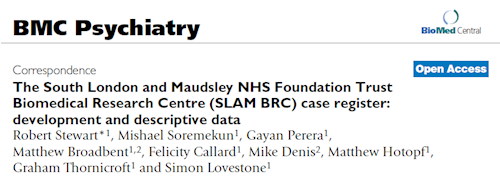
In August 2009, a research paper describing the development of the Clinical Record Interactive Search (CRIS) system was published in the open access journal BMC Psychiatry.
A £1 million grant from the National Institute for Health Research (NIHR) was awarded to the Biomedical Research Centre (BRC) to support the further development of CRIS. It was spent enhancing computing resources to link the system with census data and other large datasets including neuroimaging, genomics, and pharmacy records.
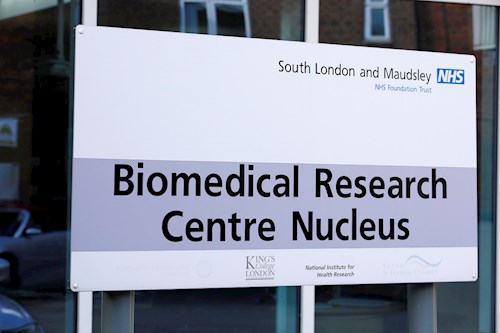
The NIHR Biomedical Research Centre (BRC) Nucleus was created through a transformational grant of £3 million from South London and Maudsley NHS Trust and Guy’s and St Thomas’ Charity. The Nucleus is a data management and informatics hub designed to support pioneering translational research into the prevention, treatment, and understanding of mental health and dementia, and to use those findings to benefit patients as quickly as possible.
The BRC Nucleus brings together specialists in informatics, biostatistics, epidemiology, psychiatry, psychology, and neuroscience to analyse complex biomedical data in a way not previously possible.
The new research tools being developed in the Nucleus are designed to improve the quality of research data and produce faster, more focused results, from large and complex clinical, genomic, proteomic, and neuroimaging data.
Over the years, work at the Nucleus has focused on developing new biomarkers and diagnostic tools, as well as novel therapies and treatments for mental health and related disorders. Patients and members of the public are fundamental in helping shape research priorities.
A patient-led oversight committee was established to ensure that all research applications comply with ethical and legal guidelines, and to review, monitor, and audit all research conducted using CRIS.
It is chaired by a service user and supported by the South London and Maudsley NHS Foundation Trust’s Caldicott Guardian (the senior person in a UK NHS Trust responsible for safeguarding patient data), as well as representatives from child protection, clinicians, and researchers.
The Clinical Record Interactive System (CRIS) was the first computer system of its kind to unlock data from the full electronic medical record.
Developed by the National Institute for Health Research (NIHR) Biomedical Research Centre at South London and Maudsley NHS Foundation Trust (the Trust) and King’s College London, and with the direct involvement of patients, CRIS provided researchers with regulated access to anonymised information contained in the Trust's medical records (Europe’s largest mental health provider).
CRIS allows researchers to extract and analyse an unparalleled quantity and quality of data, including detail behind the mental health symptoms people report, the treatments they receive, and the outcomes they experience. The system has stimulated vital research into how diseases develop, identifying people at risk, and determining the most cost-effective treatments—ultimately improving patient care and outcomes.
Professor Robert Stewart, Academic Lead for CRIS and Professor of Psychiatric Epidemiology & Clinical Informatics at King's College London said: “I’m very proud to be part of an initiative like CRIS that has genuinely broken new ground. There’s a lot of talk about the idea of using real-world information to improve real-world services, but rather fewer actual examples of this in action. At its heart, CRIS is an information governance model that enables access to clinical data for research purposes in a way that protects the legal and ethical rights of patients. From the start, patients have been directly involved in its design, implementation, and ongoing oversight, and the feedback has been universally positive.”
Read more about CRIS on our website.

